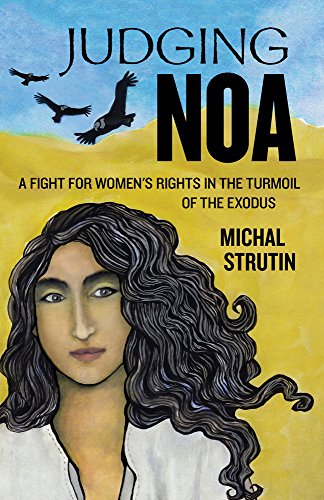Judging Noa
Judging Noa fictionalizes the incident from the Book of Numbers and Joshua in the Bible where five daughters of Zelophechad petition to be allowed property in the Promised Land since their deceased father had no male heir. The author’s website states: “These biblical verses may be the oldest written example of women pursuing their rights.”
The story starts as the twelve tribes leave the boundaries of Egypt. Early in the journey, Zelophechad is stoned to death by zealous Guardians of Truth for breaking the Sabbath. Noa brings the sisters’ case for female land inheritance to the Judges of Tens, but the judges deny their case. One judge takes Noa aside and gives her advice on how to proceed. After Noa marries Hur, she uses an uncle’s influence to bring the case to the Judges of Fifties, but again their case is heard and put off.
In the meantime, life and years goes on; Hur and Noa have children, Noa’s sisters marry, and the tribes continue wandering. Rumors circulate that Noa is a witch, Hur takes a second wife, and shocking deaths occur. The people grumble against Moses because they are dying of hunger and thirst. Noa wonders whether the predictable evils they endured in Egypt were better than the random ones they are now experiencing. When the Israelites are finally poised to enter the Promised Land, Moses agrees to hear Noa’s case.
Strutin authored a nonfiction book on the flora and fauna of Israel and succeeds very well in depicting both the Biblical landscape and women’s lives in this novel. Noa, her sisters, and even minor figures are well-rounded characters. I enjoyed experiencing the Bible stories about the Exodus from a different, female point of view. Fans of Biblical-themed fiction and those interested in women’s history will enjoy this book.










